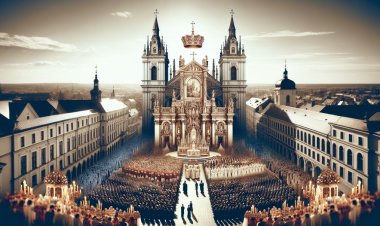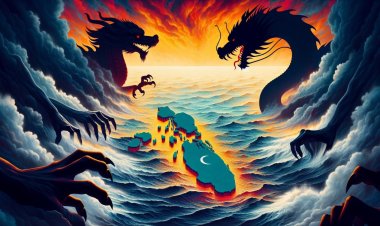The Rise and Fall of Russian Oligarchs: A Tale of Power and Influence
Witness the meteoric rise and dramatic fall of the Russian oligarchs, powerful figures who amassed vast wealth and wielded immense influence during the post-Soviet era.

Introduction
-
Background on the dissolution of the Soviet Union and Russia's transformation
-
Introduction of influential Russian oligarchs
-
The role of oligarchs in shaping Russian history
Following the dissolution of the Soviet Union in 1991, Russia entered a transformative phase. The nation underwent significant changes in its economy, marking the beginning of a new era in Russian history. It was during this pivotal period that a group of influential individuals, known as oligarchs, emerged in Russia. These powerful figures played a defining role in shaping the trajectory of the country.
The early 1990s saw Russia shift from a state-driven economy to a free market system through a process of privatisation. This economic overhaul aimed to dismantle unprofitable state-owned enterprises and pave the way for privately-owned companies to lead the economy. However, the lack of a clear regulatory framework created an opportunity for a select few individuals with political connections to exploit. These opportunists, fueled by ambition, business acumen, and access to ample resources, became the oligarchs who would dominate Russia's economic landscape.
The oligarchs strategically acquired stakes in industries poised for growth, such as energy, natural resources, media, and telecommunications. Their control over these sectors not only multiplied their wealth but also solidified their positions of power. While the privatisation process was intended to offer equal opportunities to all Russian citizens, it ultimately resulted in the consolidation of economic power among a few privileged individuals.
The oligarchs' rise to power was not solely driven by financial prowess. They recognised the significance of forming alliances and establishing political connections. These networks extended throughout the corridors of power, allowing the oligarchs to wield significant influence over policies, secure profitable agreements, and shield their interests from the winds of change.
At the core of this transformation were Russia's vast natural resources, including oil, natural gas, and minerals. The oligarchs eagerly seized this opportunity, taking advantage of the privatisation of these invaluable assets. Through financial wizardry, offshore networks, and intricate financial manoeuvres, they amassed even greater fortunes, expanding their economic empires and tightening their grip on power.
However, the ascent of the oligarchs was not without challenges and conflicts. As their influence grew, clashes erupted among this elite fraternity, and their aspirations often clashed with the state's vision. Vladimir Putin's rise to power in 1999 marked a turning point. The new leadership aimed to rebalance the distribution of power and reignite debates about the extent of oligarchic influence.
The clashes between Putin and the oligarchs symbolised a battle for supremacy. Putin's administration initiated legal challenges, anti-corruption investigations, and pressure tactics to compel the oligarchs to divest their assets or seed control. This resulted in a power struggle that significantly influenced Russia's future.
The Oligarchs' Rise
-
Shift from a state-driven economy to a free market system
-
Privatisation and consolidation of economic power
-
Formation of alliances and political connections
In the early 1990s, Russia underwent a significant economic transformation, shifting from a state-driven economy to a free market system. This period, known as privatisation, aimed to dismantle unprofitable state-owned enterprises and pave the way for privately owned companies to lead the economy. However, this process lacked a clear regulatory framework, allowing a select few individuals with political connections to take advantage of the situation.
These opportunistic individuals, fueled by ambition, business acumen, and access to ample resources, became known as oligarchs. They strategically acquired stakes in industries poised for growth, such as energy, natural resources, media, and telecommunications. Through this consolidation of economic power, they not only multiplied their wealth but also solidified their positions of influence.
However, the rise of the oligarchs was not solely driven by financial prowess. They recognised the importance of forming alliances and establishing political connections. These networks extended throughout the corridors of power, allowing the oligarchs to wield significant influence over policies, secure profitable agreements, and protect their interests.
The Oligarchs' Control over Natural Resources
At the heart of the oligarchs' rise to power was their control over Russia's vast natural resources, including oil, natural gas, and minerals. They seized the opportunity presented by the privatization of these invaluable assets, using financial wizardry, offshore networks, and intricate maneuvers to amass even greater fortunes.
By consolidating their control over major energy corporations, the oligarchs not only increased their wealth but also tightened their grip on power. Their economic empires allowed them to influence both domestic and international affairs, shaping Russia's future trajectory.
Challenges and Conflicts
However, the ascent of the oligarchs was not without challenges and conflicts. As their influence grew, clashes erupted among this elite fraternity, and their aspirations often clashed with the state's vision.
In 1999, Vladimir Putin's rise to power marked a turning point. The new leadership aimed to rebalance the distribution of power and reignite debates about the extent of oligarchic influence. Putin's administration initiated legal challenges, anti-corruption investigations, and pressure tactics to compel the oligarchs to divest their assets or relinquish control.
This power struggle significantly influenced Russia's future, leading to a shift in the dynamics of power. The rise of the siloviki, individuals with backgrounds in security and law enforcement, marked a new era of centralised and security-focused governance.
Control and wealth expansion
-
Strategic acquisition of stakes in growth sectors
-
Control over energy, natural resources, media, and telecommunications
-
Consolidation of wealth and expansion of economic empires
The rise of the Russian oligarchs was not solely a result of their financial strength. These influential figures understood the importance of strategic acquisitions and control over key sectors in order to expand their economic empires and consolidate their wealth.
Strategic Acquisition of Stakes in Growth Sectors
The oligarchs recognised the potential for growth in certain industries, such as energy, natural resources, media, and telecommunications. They strategically acquired stakes in these sectors, positioning themselves to multiply their wealth and exert control over key areas of the economy.
Control over Energy, Natural Resources, Media, and Telecommunications
By gaining control over major energy corporations, the oligarchs not only increased their wealth but also tightened their grip on power. Their economic empires allowed them to influence both domestic and international affairs, shaping Russia's future trajectory. Additionally, their control over media and telecommunications further solidified their positions of influence.
Consolidation of Wealth and Expansion of Economic Empires
Through financial wizardry, offshore networks, and intricate financial manoeuvres, the oligarchs were able to amass even greater fortunes. Their economic empires expanded, allowing them to consolidate their wealth and solidify their positions as key players in Russia's economy.
However, the ascent of the oligarchs was not without challenges and conflicts. As their influence grew, clashes erupted among this elite fraternity, and their aspirations often clashed with the state's vision.
Vladimir Putin's rise to power in 1999 marked a turning point. The new leadership aimed to rebalance the distribution of power and reignite debates about the extent of oligarchic influence. Putin's administration initiated legal challenges, anti-corruption investigations, and pressure tactics to compel the oligarchs to divest their assets or seed control. This resulted in a power struggle that significantly influenced Russia's future.
Challenges and Conflicts
-
Clashes between oligarchs and the state's vision
-
Vladimir Putin's rise to power and its impact on oligarchs
-
Power struggles and legal challenges
The ascent of the Russian oligarchs was not without challenges and conflicts. As their influence grew, clashes erupted among this elite fraternity, and their aspirations often clashed with the state's vision.
Clashes between Oligarchs and the State's Vision
The oligarchs' rise to power and their control over key sectors of the economy posed a challenge to the state's authority. Their immense wealth and influence threatened to overshadow the government's objectives and policies, leading to clashes between the oligarchs and the state's vision for Russia's future.
Vladimir Putin's Rise to Power
Vladimir Putin's rise to power in 1999 marked a turning point in the relationship between the state and the oligarchs. Putin aimed to rebalance the distribution of power and reignite debates about the extent of oligarchic influence. His administration initiated legal challenges, anti-corruption investigations, and pressure tactics to compel the oligarchs to divest their assets or relinquish control.
The impact of Putin's rise to power on the oligarchs was significant. Many oligarchs who had previously wielded substantial influence suddenly found themselves facing a formidable adversary in Putin. The power struggle between Putin and the oligarchs shaped the future of the country and redefined the dynamics of power in Russia.
Power Struggle and Legal Challenges
The power struggle between Putin and the oligarchs was not limited to political manoeuvring. Putin's administration utilised legal challenges and anti-corruption investigations to weaken the oligarchs' political influence and their financial hold on key industries.
The oligarchs, however, were not willing to surrender without a fight. They utilised their substantial resources and strategic acumen to defend their assets and protect their interests. Legal countermeasures, political manoeuvring, and media campaigns became part of their arsenal as they sought to shield their acquisitions and sway public opinion.
This power struggle and the legal challenges faced by the oligarchs significantly influenced Russia's future. It led to a shift in the dynamics of power, with the rise of the siloviki—individuals with backgrounds in security and law enforcement—marking a new era of centralised and security-focused governance in Russia.
The Rise of the Siloviki
-
Introduction of the Siloviki Group
-
Their power dynamics and influence
-
Shift towards centralised and security-focused governance
Amidst the power struggles between Putin and the oligarchs, a new group emerged in Russia known as the Siloviki. These individuals, with backgrounds in security and law enforcement, marked a shift towards a more centralised and security-focused form of governance.
Introduction of the Siloviki Group
The term "siloviki" derives from the Russian word "sovik," meaning a person of power or force. This group consisted of individuals from agencies such as military intelligence services, the police, and other security branches. Their affiliation with strength, control, and unwavering loyalty to the state and its leadership set them apart.
Their Power Dynamics and Influence
The siloviki operated with a hierarchical structure and a pragmatic governance approach. They prioritised stability and control, making them a formidable force within Russia's political landscape. Their unwavering loyalty to Putin and his vision was of paramount importance, leading to advancements within the hierarchy of power for those who aligned with his policies.
Shift towards Centralised and Security-Focused Governance
The rise of the siloviki marked a shift towards a more centralised and security-focused form of governance. This complemented Putin's leadership style, which prioritised stability, control, and a pragmatic approach to national governance. The Siloviki's influence and power dynamics reshaped Russia's political landscape, with their presence being felt in both domestic and international affairs.
As the power struggle between Putin and the oligarchs unfolded, the Siloviki became an influential force, embodying a unique fusion of political influence and security expertise. Their rise represented a new era in Russia's governance, one characterised by a centralised and security-focused approach.
Consequences for Oligarchs
-
Risk of opposing Putin's regime
-
Prominent examples of opposition and their fates
-
Rewards for oligarchs who aligned with Putin
The decision to oppose Vladimir Putin's regime is fraught with risk for Russian oligarchs. Those who dare to challenge the Kremlin's authority often face severe consequences, including legal challenges, imprisonment, asset confiscation, or even tragic fates. The power struggle between Putin and the oligarchs is a battle for supremacy that significantly influences Russia's future.
Risk of Opposing Putin's Regime
Oligarchs who openly oppose Putin's rule put themselves in a precarious position. Examples like Mikhail Khodorkovsky, Boris Berezovsky, and Alexei Navalny highlight the dangers of crossing Putin's path. Khodorkovsky, once a powerful figure in the Russian oil industry, openly contested Putin's political direction and funded opposition parties. As a result, he was apprehended, his oil company, Yukos, was dismantled, and he was imprisoned for a decade.
Berezovsky, a former oligarch and media magnate, also became a vocal critic of Putin and eventually went into self-imposed exile in the UK. Despite his efforts to rally opposition forces from abroad, his mysterious death in 2013 underscored the high stakes associated with political dissent.
Alexei Navalny, a prominent anti-corruption activist and opposition figure, has faced repeated arrests, threats, and even an assassination attempt believed to be orchestrated by Russian security services. His unwavering commitment to exposing corruption and criticising the Kremlin has made him a symbol of resistance but also a target of the authorities.
Prominent Examples of Opposition and Their Fates
The fates of Mikhail Khodorkovsky, Boris Berezovsky, and Alexander Litvinenko serve as chilling examples of the lengths to which the Kremlin might go to silence dissent. Khodorkovsky's imprisonment, Berezovsky's mysterious death, and Litvinenko's poisoning with radioactive polonium in London underscore the severe consequences faced by those who challenge Putin's authority.
Rewards for Oligarchs Who Aligned with Putin
On the other hand, oligarchs who aligned themselves with Putin often found themselves in advantageous positions. Roman Abramovich, for example, successfully merged his business endeavours with political affiliations, solidifying his status as a key player in both spheres. His ownership of Chelsea Football Club, grand yachts, and luxury properties showcased his immense wealth and influence.
Mikhail Prokhorov and Alisher Usmanov, two oligarchs closely connected to the Russian government, also saw their fortunes rise during Putin's presidency. Prokhorov's involvement in politics, including running for president as an independent candidate, did not impede his success. Usmanov's deep passion for art and philanthropy further underscored his opulent lifestyle.
These examples illustrate the complex interplay between wealth, influence, and political alignment in Russia. While the oligarchs who aligned with Putin enjoyed opulent lifestyles, they also faced the potential consequences of geopolitical shifts, such as Western sanctions. The disruption caused by sanctions and heightened scrutiny from international regulatory bodies challenged their previous unchecked extravagance and exposed the limitations of their power.
Opulent Lifestyles of Oligarchs
-
The lifestyle and luxury of Russian oligarchs
-
Examples of Roman Abramovich, Mikhail Prokhorov, and Alisher Usmanov
-
Opulent residences, private jets, and yachts
While the rise and fall of Russian oligarchs has been a subject of great interest and scrutiny, their opulent lifestyles have also captured the public's attention. These influential figures have indulged in lives of luxury with no expense spared. Let's take a closer look at the lavish lifestyles of some of the most prominent Russian oligarchs.
Lifestyle and Luxury of Russian Oligarchs
The oligarchs' immense wealth has allowed them to lead lives of unparalleled luxury. They have access to the finest things money can buy, from luxurious properties to private jets and yachts. These symbols of opulence are a testament to their extraordinary financial success and influence in Russian society.
Examples of Roman Abramovich, Mikhail Prokhorov, and Alisher Usmanov
Roman Abramovich, a close confidant of President Putin, has become synonymous with opulence. As the owner of Chelsea Football Club, Abramovich's extravagance extends to his grand yachts, luxurious estates, and high-end art collections.
Mikhail Prokhorov, known for his involvement in various industries, including mining and media, exudes a cosmopolitan aura. His ownership of the Brooklyn Nets basketball team and his opulent living spaces showcase his dynamic lifestyle.
Alisher Usmanov, with his background in metals and mining, has risen to become one of Russia's wealthiest individuals. His acquisitions, such as a significant stake in Arsenal Football Club, further elevate his international profile.
Opulent Residences, Private Jets, and Yachts
The oligarchs' opulent residences serve as tangible symbols of their extraordinary wealth. From expansive villas in the French Alps to penthouses overlooking Manhattan, these properties reflect their global reach.
Their private jets, customised for their jet-setting lifestyles, allow them to seamlessly travel the world in style, overseeing their vast empires. These aircraft are not simply modes of transportation but mobile command centres.
The oligarchs' grand yachts epitomise their extravagant lifestyles. Equipped with multiple swimming pools, dedicated disco halls, and even missile defence systems, these floating palaces offer unparalleled luxury on the high seas.
While the opulent lifestyles of the oligarchs have long been admired, their alignment with Putin's regime has also exposed them to unprecedented challenges. Western sanctions and heightened scrutiny have disrupted their previous unchecked extravagance and highlighted the limitations of their power in a rapidly changing geopolitical landscape.
Impact of Western Sanctions
-
Introduction of Western sanctions and their goals
-
Financial challenges faced by the oligarchs
-
Disruption of opulent lifestyles and limitations of power
Amidst the turbulent geopolitical landscape characterised by Vladimir Putin's aggression towards Ukraine and the subsequent imposition of Western sanctions, the lives of Russian oligarchs who had aligned themselves with Putin's authority underwent a profound transformation. The opulent existence they had carefully crafted now confronted unprecedented challenges that reshaped their influence and altered their extravagant lifestyles.
Introduction of Western Sanctions and Their Goals
The European Commission's Priests and Seas Task Force, established to enforce sanctions against Russians and Belarusians, emerged as a pivotal force in curtailing the financial manoeuvres of the oligarchs. The primary goal of this initiative was to freeze and confiscate the assets of those targeted by the sanctions. Collaborating with the International Russian Elites Proxies and Oligarchs Repo Task Force, comprising seven nations and the European Union, further amplified these efforts.
Financial Challenges Faced by the Oligarchs
The sanctions were aimed not only at the personal wealth of the oligarchs but also at disrupting the financial channels that fueled Putin's war machine. The task forces' actions aimed to reduce Putin's regime's financial support and lessen the influence of the oligarchs in his inner circle. As a result, the oligarchs faced significant financial challenges and the potential loss of their vast fortunes.
Disruption of Opulent Lifestyles and Limitations of Power
The imposition of sanctions and heightened scrutiny from international regulatory bodies disrupted the opulent lifestyles that the oligarchs had grown accustomed to. The restrictions placed on their financial activities limited their ability to maintain their extravagant lifestyles. The repercussions of the oligarchs' alignment with Putin's agenda now limit their once unchecked extravagance.
These challenges and limitations highlighted the vulnerabilities of the oligarchs and exposed the fragility of their power. While they had amassed immense wealth and influence through their ties to the Russian government, the sanctions revealed the extent to which their power was contingent on the support of Putin's regime. The oligarchs now faced the difficult decision of whether to continue to align themselves with Putin or to take a stand against his actions and face the potential consequences.
Conclusion
-
The ambiguous influence of Russian oligarchs
-
Questioning their ability to alter Putin's regime
-
The ongoing power struggle and protective forces
The rise and fall of Russian oligarchs is a tale of power, influence, and constant change. These influential figures emerged during a transformative period in Russia's history and quickly solidified their positions of wealth and authority. However, their influence is not without complexities and challenges.
While the oligarchs wielded significant economic power and political connections, their true influence over the trajectory of Putin's regime remains ambiguous. Despite their immense wealth and control over key industries, their ability to alter Putin's vision for Russia's future is questionable.
The power struggle between Putin and the oligarchs has been ongoing and continues to shape Russia's political landscape. Putin's administration has utilised legal challenges, anti-corruption investigations, and pressure tactics to weaken the oligarchs' influence and control over key industries. However, the oligarchs have not gone down without a fight, utilising their resources and strategic acumen to defend their assets and protect their interests.
Amidst this power struggle, the rise of the siloviki, individuals with backgrounds in security and law enforcement, has further complicated the dynamics of power in Russia. These individuals embody a centralised and security-focused form of governance, aligning themselves with Putin's vision and challenging the influence of the oligarchs.
The consequences of opposing Putin's regime have been severe for the oligarchs. Examples such as Mikhail Khodorkovsky, Boris Berezovsky, and Alexei Navalny highlight the risks and potential tragic fates that await those who challenge the Kremlin's authority. On the other hand, oligarchs who align themselves with Putin often enjoy opulent lifestyles and rewards for their loyalty.
However, the imposition of Western sanctions has disrupted the opulent lifestyles of the oligarchs and highlighted the limitations of their power. These sanctions, aimed at freezing assets and disrupting financial channels, have challenged their previous unchecked extravagance and underscored the vulnerabilities of their alignment with Putin's regime.
In conclusion, the rise and fall of Russian oligarchs is a complex and ever-evolving tale. Their influence over Putin's regime is ambiguous, and the ongoing power struggle between the oligarchs and the siloviki continues to shape Russia's future. The consequences of opposing Putin's regime are severe, while aligning with Putin can lead to opulent lifestyles. The imposition of Western sanctions has disrupted the opulent lifestyles of the oligarchs and exposed the limitations of their power. As Russia's political landscape continues to evolve, the role of the oligarchs and their ability to shape the country's future remain uncertain.



 admin
admin 










